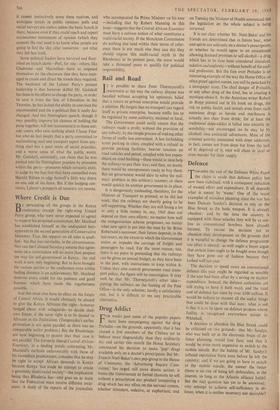Rail and Road
IT is possible to share Peter Thorneycroft's resentment at the way the railway dispute was handled without accepting his optimistic belief that a return to private enterprise would provide a solution. He forgets that no transport can regard itself as private enterprise, because traffic has to be regulated by some authority, national or local.
The Government could easily ensure that the railways made a profit, without the provision of any subsidy, by the simple process of making other forms of traffic less convenient. A law forbidding street parking in cities, coupled with a refusal to provide parking facilities; heavier taxation on road vehicles and petrol, coupled with less expen- diture on road building—these would in time help the railways to pay their way; and then, no doubt, there would be entrepreneurs ready to buy them. But no government would dare to solve the rail- ways' problem in this arbitrary manner; or there would quickly he another government in its place.
It is dangerously misleading, therefore, for the Minister of Transport to pretend, as he did last week, that the railways are shortly going to be self-supporting. Whether they are still losing a lot or only a little money in, say, 1965 does not depend on their own efforts : no matter how well the reorganisation scheme progresses, no matter what new spirit is put into the men by Sir Brian Robertson's successor, their future depends, in the last resort, on the extent to which the Government assists or impedes the carriage of freight and passengers by road. For the same reason, too, there is no point in pretending that the railways can be given an annual budget, as they have been in the past, with instructions to keep within it. Unless they also control government road trans- port policy, the figure will be meaningless. It may well be that Mr. Thorneycroft's other idea— putting the railways on the footing of the Post Office—is the only solution; hardly a satisfactory one, but it is difficult to see any practicable alternative.






































 Previous page
Previous page